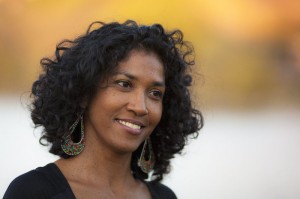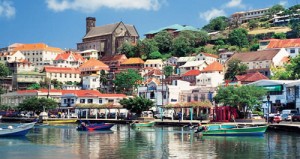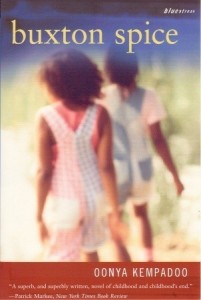
Oonya Kempadoo (photo: Greg Bal)
OONYA KEMPADOO will be guest author for my Spice Isle Writing & Yoga Retreat, coming up April 7 to 14, 2013, at Petite Anse Hotel on the island of Grenada.
Oonya has lived most of her life in various Caribbean islands and currently lives in St. George’s, Grenada. Her first novel, Buxton Spice (1998), was longlisted for the Orange Prize and translated into six languages. Her second novel, Tide Running, won a Casa de las Américas 2002 prize and was well received on both sides of the Atlantic. Oonya was named “a Great Talent for the 21st Century” by the Orange Prize judges and both books were nominated for the International IMPAC Dublin Literary Award. In 2011 Oonya was awarded a fellowship for the International Writing Program at The University of Iowa, and her next novel, All Decent Animals, will be published in spring 2013 (Farrar, Straus and Giroux, USA). She is currently completing a non-fiction narrative of local perspectives of sexual abuse, and a film adaptation of Tide Running. She has worked with UNICEF and UNAIDS as a consultant and researcher, and has been tempted by travel writing and agricultural journalism.
(Below: view a video interview with Oonya, part of a series created by the International Writing Program at the University of Iowa titled “On the Map.”)
* * *
“That’s the lovely part — that’s the daydreaming part of writing — where everything melds together and anything is possible because you are living in that moment.” ~ Oonya Kempadoo
Your parents are Guyanese, and you were born in England and have lived in Guyana as well as in St. Lucia, Trinidad, Tobago, and Grenada. How has being exposed to various cultures influenced you? Your writing?
Adjusting and adapting to new societies has increased my observational skills and encourages me to keep an open mind as it questions what I think I know or understand. I try to convey this in my characters’ perspectives — to not give a message but rather let the circumstances and environment convey a realistic picture.
You make your home now in St. George’s, Grenada. What drew you there?
 Island life, on a scale that both the urban and rural are accessible, and the sea.
Island life, on a scale that both the urban and rural are accessible, and the sea.
How much of the year are you there and how much of it are you working elsewhere?
I travel once or twice a year, sometimes to academic or literary events, or for research work, and I am looking forward to visiting Canada in early May for the Toronto Festival of Literature and the Arts.
Did you write as a child? And how much did the other writers in your family influence you?
Creative writing was my favourite subject in our home-school as a child. My mother, who was a teacher, encouraged our practising writing outdoors, connected to nature. My father wrote two novels (Old Tom’s Harvest and Guyana Boy), my mother wrote short stories and helped with printing folk tales, my eldest sister, Manghanita, published a humorous book as a teenager (in the UK), and my other sister, Kamala (who teaches social science at York University in Toronto), is well known for her academic publications — so there is family pride and encouragement.
What authors have inspired you, past or present?
John Steinbeck, Ernest Hemingway, Samuel Selvon, Patrick McCabe, Maya Angelou, Haruki Murakami, Paul Auster . . .
What was the creative spark for your first novel, the semi-autobiographical Buxton Spice (1997)?
 I read Canary Row (Steinbeck) and Miguel Street (Naipaul) whilst a teenager in my village in Guyana and wrote some character sketches of people around me, so when I decided to try writing in 1997, I began there.
I read Canary Row (Steinbeck) and Miguel Street (Naipaul) whilst a teenager in my village in Guyana and wrote some character sketches of people around me, so when I decided to try writing in 1997, I began there.
What challenges did you face in combining real life and fiction?
That’s the lovely part — that’s the daydreaming part of writing — where everything melds together and anything is possible because you are living in that moment.
Do you develop an outline for your novels, or just begin and let the writing take you where it may?
Each novel is different. I began with just writing for the first two.
You’ve been published in a variety of forms — novels, travel writing, agricultural journalism — and you’re working on a screenplay based on your novel Tide Running (2001). With so many avenues, do you sometimes find it overwhelming to decide which to follow?
Which one to work on becomes an organic process according to the stage it is at and the time I have. What gets in the way is other work for pay.
What sort of writing do you enjoy most? Why?
Novel/creative writing. It is the most liberating.
Can you tell us about your most recent social development work? And how do such commitments and efforts tie into your writing?
Researching HIV-related population groups and behaviour across the Caribbean region has deepened my understanding of the undercurrents of the society, civil society, and disadvantaged members of the society.
Your latest novel, All Decent Animals (forthcoming May 2013), has been described as “a forthright inquiry into the complexity of character, social issues and island society, with all of its humour, mysticism, and tragedy.” In what ways might readers find it similar to, or a departure from, your previous novels?
This is my first urban novel, but there’s still a drift into “other” worlds and the role of nature.
What’s it like being a judge for the Commonwealth Writers’ Short Fiction Prize 2013?
Very interesting reading! It has increased my sense of the value of a good short story.
What’s the best advice on writing you ever received?
“Just write.”
The worst?
“It [your writing] is okay.”
* * *
Watch this 2011 interview with Oonya Kempadoo (7:01 mins), part of the series “On the Map: Interviews with Writers in Residence,” International Writing Program, The University of Iowa:
Oonya Kempadoo (in the interview) sounds like a thoughtful person, focused on sharing stories for educating others about culture. I’m sorry I’m going to miss hearing this charming author talk about writing at the retreat.
I am not at all surprised at the accomplishments of Oonya. She has always been an excellent writer. Her closeness to nature and the community has always been a part of who she is.
I wish Oonya success in all of her future endeavors.